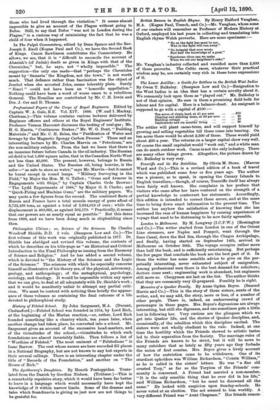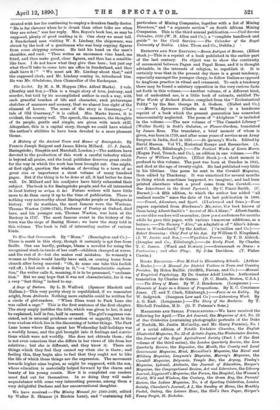Memoirs of a Quaker Family. By Anne Ogden Boyce. (Samuel
Harris and Co.)—This is the story of three sisters, aunts of the writer, and, we may add, the story, more or less, of a number of other people. There is, indeed, an embarrassing crowd of personages in these pages. Mrs. Boyce's digressions are always interesting, but still she digresses, and one sometimes gets a little lost in following her. Very curious are the glimpses which we get into Quaker life, and the stories of Quaker discipline, and, occasionally, of the rebellion which this discipline excited. The sisters were not wholly obedient to the rule. Indeed, at one time the hostility which the Friends showed to artistic tastes led to their separation from the Society. The marriage rules of the Friends are known to be strict, but it will be news to many outsiders that as lately as fifty years ago they forbade the union of first cousins. Mrs. Boyce gives a lively account of how the restriction came to be withdrawn. One of its sturdiest upholders was William Richardson, "Cousin William," as he is called in the sisters' letters. He was "a fine old crusted Tory," as far as the Toryism of the Friends' com- munity is concerned. A Friend had married a non-member. "It is the only sensible thing that he ever did in his life," said William Richardson, "but he must be disowned all the same." He looked with suspicion upon Sunday-schools. He never voted at an election. The act seemed to him worldly. A. very different Friend was "Aunt Chapman." Her friends remon- strated with her for continuing to employ a drunken family doctor. " He is far cleverer when he is drunk than other folks are when -they are sober," was her reply. Mrs. Boyce's book has, as may be supposed, plenty of good reading in it. One story we must tell. A Sunderland man visiting W. S. Lindsay, the shipowner, was struck by the look of a gentleman who was busy copying figures from some shipping returns. He laid his hand on the man's shoulder, and said: " Thoo writes an uncommon vine hand, ma frind, and thoo maks good, clear figures, and thoo has a sensible- like face. I do not know what they give thee here ; but just say what thoo'll take to come into ma office in Sunderland, and thoo shalt have it !" "We must ask Mr. Lindsay about that," said the supposed clerk, and Mr. Lindsay coming in, introduced him. He was Mr. Gladstone, then Chancellor of the Exchequer.



































 Previous page
Previous page